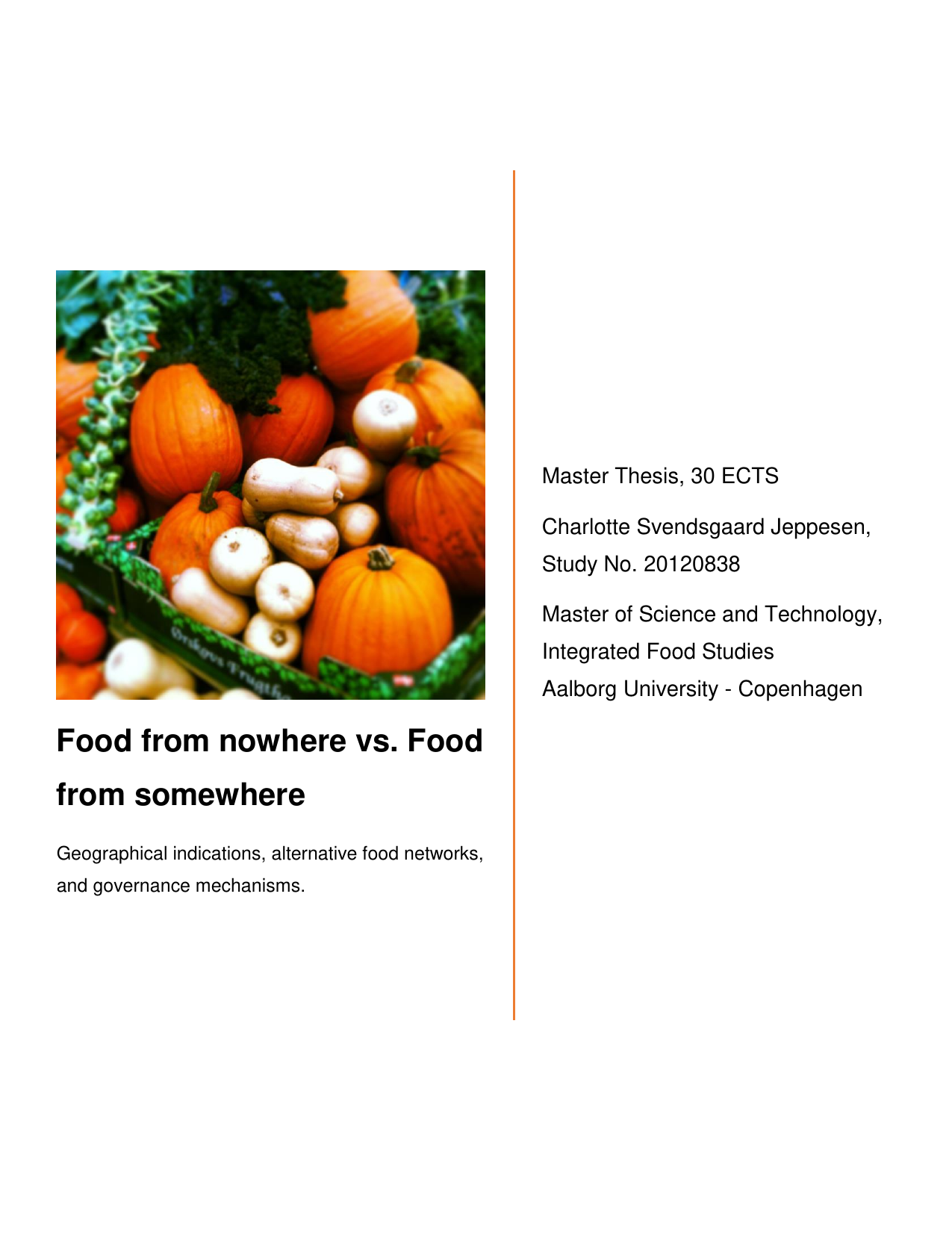
Food from nowhere vs. Food from somewhere: Geographical indications, alternative food networks, and governance mechanisms.
Term
4. term
Publication year
2014
Submitted on
2015-01-04
Pages
76
Abstract
Introduktion: Der er stigende fokus på fødevare produktion og kvaliteten af disse fødevarer. Som et resultat er der en stigning i etablering af alternative fødevarenetværk. EU har implementeret regional fødevaremærkning, for derigennem at sikre kvaliteten af især europæiske fødevarer. I Danmark er der kun seks produkter der er certificerede, alle med BGB mærkning, hvoraf størstedelen er større producenter. Problem formulering: Hvad er opfattelsen af regional fødevaremærkning i Danmark, og hvordan udfordre denne opfattelse den nuværende regeringsform? Metode: Specialet er baseret på litteratur studier semi-strukturerede interviews med producenter fra Dansk Netværk for Terroir, BGB certificerede Lammefjordens Grøntsagslaug, Fødevarestyrelsen og konsulent firmaet AgroTech. Informanterne er udvalg på baggrund af Situationel analysis og Grounded theory, som endvidere har konstrueret den teoretiske tilgang. Teori: Den teoretiske ramme er baseret på Social Construction of Technology. Herunder over er der tilføjet teoretiske aspekter i forhold til alternative fødevarenetværk, fødevaremærkning, samt kulturelle aspekter af fødevareproduktion. Endvidere er Governance triangle, og Technological systems tilføjet det teoretiske aspekt. Analyse: Analysen er udfærdiget med en kombination af teori, interviews og hovedkonklusioner fra litteratur studie. Konklusion: Der er manglende kendskab til de regionale fødevaremærkninger, og generel mangel på interesse i forhold til fødevaremærkninger. Opfattelsen af GI er at dette er et bureaukratisk system, som ikke afhjælper mindre producenters adgang til markedet, systemet udelader den sociale kontekst, og passer derfor ikke ind i det danske fødevaresystem. I Danmark sidestilles regionale fødevarer ikke med kvalitet. Kvalitet defineres på baggrund af objektive indikationer, som eks. fødevaresikkerhed. De alternative fødevarenetværks værdier stemmer overens med definitionen af Terroir. De BGB registrerede fødevarer i Danmark er hovedsagelig fundet blandt større producenter. Alternative fødevarenetværk har en anden tilgang til governance end GI, derfor udfordre dette den nuværende reguleringsform. Nøgleord: regional fødevaremærkning, alternative fødevarenetværk, Terroir, lokalefødevarer, governance.
Introduction: There is an increasing focus on food production methods and food quality, and as a derivative alternative food networks are emerging. Within the European Union, Geographical indication certifications are implemented as a way to guarantee food quality. Currently Denmark only holds six certifications (PGI), and the current certification are amongst larger producers. Problem statement: What is the perception of the Geographical indications in Denmark, and how does this perception contribute to challenge current means of governance? Methodology: The study is based on archival research and six semi-structured interviews with producers from Netværk for Dansk Terroir, PGI certified Lammefjorden Grøntsagslaug, AgroTech consultancy firm and Danish Veterinary and Food Administration. The interviewees have been selected based on Situational analysis and Grounded theory, which have also shaped the theoretical approach. Theory: Social Construction of Technology serves as the theoretical framework. Additionally, theoretical aspects of alternative food networks, certifications, and cultural aspects of food production are an integrated approach. Moreover, the Governance triangle and Technological systems are included in the theoretical approach. Analysis: The analysis combines the theoretical approach with preformed interviews. This is supplemented with key point from the literature search. Conclusion: There is a lack of knowledge of the Geographical indications among the Terroir producers and a general lack of interest in certifications. The Geographical indications are perceived as a bureaucratic system, which does not facilitate market access for small-scale producers. The system leaves out the social context and does therefore not fit in to the Danish food system. The Danish food system does not perceive place of origin as quality. Quality is related to objective indicators, mainly food security. The alternative network and their values links to the term Terroir, however the current PGI registrations are predominantly held by larger producers. Alternative food networks are focusing on a bottom-up approach with a closer contact to the consumers. Whereas the Geographical indications is constructed a top-down governance approach, this challenges the current means of governance. Keywords: Geographical indication, alternative food networks, terroir, certification, local food, governance.
Documents
